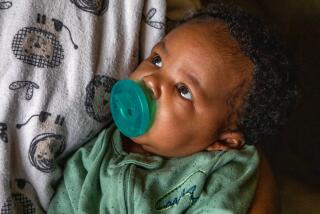Study Questions Custom of Having Babies Sleep Alone
- Share via
ORANGE — For most Americans, independence starts in the cradle--infants sleep alone, usually in their own rooms and beds.
A Pomona College professor challenged a group of parents and nurses Friday to rethink this long-accepted cultural norm.
Based on anthropological records and animal development studies, anthropology professor James McKenna said he believes babies who sleep beside their parents may have better chances of surviving the No. 1 cause of death for newborns--sudden infant death syndrome.
“A vast amount of individuals in the world are still sleeping with their children,” McKenna said during a conference on SIDS at Children’s Hospital of Orange County in Orange. “It is a life-affirming, survival-related relationship. Non-human primates depend on ‘co-sleeping’ for survival.”
Describing SIDS as “almost death by nothing,” McKenna presented preliminary findings of an ongoing three-year study that he has conducted with five other researchers. The study has looked at child-care habits that might help prevent the onset of this mysterious illness with no known cause or cure.
Babies that sleep with their parents could have reduced some of the SIDS risk factors, which include sleeping face down, not enough physical contact with the mother and extended time spent in deep sleep, McKenna said.
But he stressed that sleeping with parents is not a cure for SIDS and that positioning a baby on the back or side--rather than face down--is the most important factor in reducing the chance of SIDS.
“My intension is not to advocate what any individual should do with their babies,” McKenna said. “We need to expand the options for our children and try to raise new questions on the range of possible environmental factors that might optimize our children’s survival.”
Orange County reported 31 SIDS cases last year, according to the coroner’s office. Twelve infants have died so far this year. Experts at the conference said the deaths are most common during winter months.
About 1.4 per 1,000 babies in the United States die of SIDS each year, accounting for 40% of all infant deaths in the country. Of the SIDS deaths, most occur by age 6 months.
“Until I heard it discussed today, I would have been against (sleeping with parents), because of the question of suffocation,” said Janet Cozad, a Huntington Beach nurse and pediatrics instructor. “In the past, people have said you can roll over and suffocate your baby. Also, our culture says the kids should be by themselves and parents should have their privacy. Now I have to think about it, at least keep an open mind.”
Glenn Morinishi is an Anaheim family practice doctor whose 3-month-old daughter died of SIDS in a baby-sitter’s home more than a year ago. Morinishi said he and his wife would do anything to ensure the survival of their next child, but changing his sleeping arrangement would be very difficult.
“It would be too disruptive,” said Morinishi, who attended Friday’s conference with his wife, Shari, a pharmacist. “If you don’t get a good six hours of sleep at night, you feel like you’ve been run over by a truck. If (my wife) feels so strongly about the baby sleeping between us I’ll probably end up on the couch or on the floor, or I’ll have to get a bigger bed.”
James Beisner, the county’s chief deputy coroner, said he has seen as many as 75 Orange County babies die of SIDS a year. If he could raise his own three adult children again, Beisner said Friday he would invite all of them to his and his wife’s bedroom.
“When my children were small, they said you shouldn’t hold them so much because they will become dependent,” Beisner said. “Knowing what we know today, we would have held them all the time. I don’t think you have to make parents (sleep with their children), I think you have to let them know it is OK.”
(BEGIN TEXT OF INFOBOX / INFOGRAPHIC)
Reducing SIDS Risk
Here are some preventive steps parents can take to help reduce the chances of Sudden Infant Death Syndrome:
* Obtain early prenatal care
* Decrease or eliminate maternal smoking
* Decrease or eliminate household smoking
* Do not place child in prone (on stomach) sleeping position
* Decrease or eliminate maternal substance abuse
* Avoid overheating
* Do not place infant on soft or porous sleeping surfaces
* Increase breast feeding
* Use targeted apnea monitoring
Source: Children’s Hospital of Orange County






